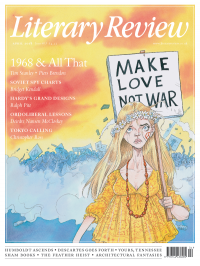Amir-Hussein Radjy
Best of Enemies
Making the Arab World: Nasser, Qutb, and the Clash that Shaped the Middle East
By Fawaz A Gerges
Princeton University Press 483pp £24.95
Gamel Abdel Nasser’s Philosophy of the Revolution (1955) is written in a charismatic style, though it is thin on substance – much like the man who purportedly penned this booklet. What is blatantly clear is Nasser’s belief in the Egyptian army. ‘Throughout my life I have had faith in militarism,’ the Egyptian leader declares. ‘The soldier’s sole duty is to die on the frontiers of his country.’ In the decades since Nasser wrote this, Egypt’s army, while lacking any strategic vision for the country, has proved itself tactically brilliant at dominating Egyptian politics, taking up and brutally dispensing with political allies on the Left and Right, secular and Islamist, as befits its interests. Nasser, before leading the July 1952 Free Officers coup that overthrew the monarchy and placed the army in control of Egypt, was briefly a member of the Muslim Brotherhood. As president, he lost every war he fought against Israel, but he succeeded in brutally crushing the Brotherhood.
What some see as Nasser’s faithlessness, others see as a maverick ability to govern a divided country. In Making the Arab World, Fawaz Gerges points out that Seyyed Qutb, whom many today consider the founding theorist of militant jihadism, was similarly eclectic in his ideological loyalties. Remarkably, Qutb

Sign Up to our newsletter
Receive free articles, highlights from the archive, news, details of prizes, and much more.@Lit_Review
Follow Literary Review on Twitter
Twitter Feed
In fact, anyone handwringing about the current state of children's fiction can look at over 20 years' worth of my children's book round-ups for @Lit_Review, all FREE to view, where you will find many gems
Literary Review - For People Who Devour Books
Book reviews by Philip Womack
literaryreview.co.uk
Juggling balls, dead birds, lottery tickets, hypochondriac journalists. All the makings of an excellent collection. Loved Camille Bordas’s One Sun Only in the latest @Lit_Review
Natalie Perman - Normal People
Natalie Perman: Normal People - One Sun Only by Camille Bordas
literaryreview.co.uk
Despite adopting a pseudonym, George Sand lived much of her life in public view.
Lucasta Miller asks whether Sand’s fame has obscured her work.
Lucasta Miller - Life, Work & Adoration
Lucasta Miller: Life, Work & Adoration - Becoming George: The Invention of George Sand by Fiona Sampson
literaryreview.co.uk